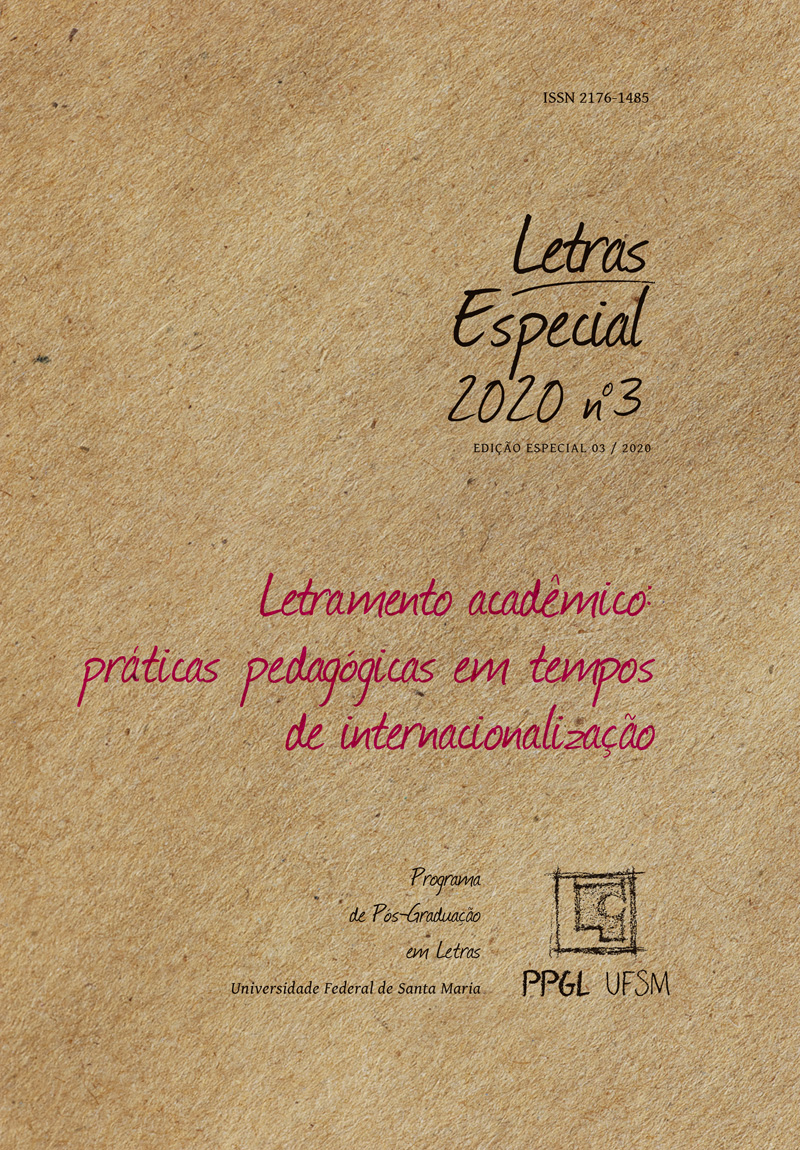O INGLÊS NÃO É UM SÓ: DESENVOLVIMENTO DO CONCEITO DE INGLÊS COMO LÍNGUA FRANCA EM UM CURSO DO PROGRAMA IDIOMAS SEM FRONTEIRAS
DOI:
https://doi.org/10.5902/2176148548477Parole chiave:
Desenvolvimento de Conceitos. Inglês como Língua Franca. Programa Idiomas sem Fronteiras.Abstract
Este artigo objetiva reportar o desenvolvimento do conceito de inglês como língua franca (ILF) por cinco participantes de um curso presencial de curta duração ministrado por dois professores em formação inicial, no âmbito do Programa Idiomas sem Fronteiras em uma universidade pública municipal brasileira. Dois instrumentos de coleta de dados foram utilizados: respostas a dois quizzes realizados durante o curso e um questionário aplicado posteriormente. Em seus discursos, os participantes trouxeram à tona a compreensão crítica dos conceitos de falante nativo, imperialismo, juízo de valor, preconceito linguístico, empoderamento, monitoramento linguístico, variação linguística e foco nas práticas comunicativas.Downloads
Riferimenti bibliografici
BAKHTIN, M. Marxismo e filosofia da linguagem. 12 ed. Hucitec: São Paulo, 2006.
BRASIL. Ministério da Educação. Gabinete do Ministro. Portaria nº 1.466, de 18 de dezembro de 2012. Institui o Programa Inglês sem Fronteiras. Diário Oficial da União, Brasília, DF, 19 dez. 2012. p.28-29. Disponível em: http://isf.mec.gov.br/images/pdf/portaria_normativa_1466_2012.pdf. Acesso em jan. 2019.
______. Ministério da Educação. Base Nacional Comum Curricular. Brasília, DF: 2018. Disponível em: http://basenacionalcomum.mec.gov.br/images/BNCC_EI_EF_110518_versaofinal_site.pdf. Acesso em jan. 2019.
CELCE-MURCIA, M. Language Teaching Approaches: An Overview. In: ______. (ed.). Teaching English as a Second or Foreign Language. 3 ed. Boston: Heinle & Heinle, 2001, p. 3-11.
COUNCIL OF EUROPE. Common European framework of reference for languages: Learning, teaching, assessment. Cambridge, UK: Press Syndicate of the University of Cambridge, 2001.
DAVIS, B. G. Tools for Teaching. 2nd edition. San Francisco, USA: Jossey-Bass, 2009.
ELLIS, R. The study of second language acquisition. 2nd ed. Oxford University Press, 2008.
FREIRE, P. Pedagogia do Oprimido. 39. ed. Rio de Janeiro: Paz e Terra, 2011.
FRIEDRICH, P., MATSUDA, A. When Five Words Are Not Enough: a conceptual and terminological discussion of English as a lingua franca. International Multilingual Research Journal, v. 4, n. 1, p. 20-30, 2010.
GEE, J. P. Learning language as a matter of learning social languages within discourses. In: M. Hawkins (Ed.). Language learning and teacher education: A sociocultural approach. Clevedon, UK: Multilingual Matters, 2004, p. 13-31.
HARMER, J. The practice of English language teaching. 3rd edition. Essex, UK: Pearson Education, 2001.
JOHNSON, K. E. Second language teacher education: a sociocultural perspective. New York, USA: Routledge, 2009.
JORDÃO, C. M. ILA – ILF – ILE – ILG: Quem dá conta? RBLA, Belo Horizonte, v. 14, n. 1, p. 13-40, 2014.
KACHRU, B. B. Standards, codification and sociolinguistic realism: the English language in the outer circle. In: R. Quirk, H.G. Widdowson (Eds.). English in the world: teaching and learning the language and literatures. Cambridge: Cambridge University Press, 1985, p. 11-30.
LIPPI-GREEN, R. English with an accent: language, ideology, and discrimination in the United States. 2nd edition. New York: Routledge, 2012.
MUNRO, M. J., DERWING T. M. Processing time, accent, and comprehensibility, and intelligibility in the speech of second language learners. Language learning, v. 49, p. 285- 310, 1995.
PENNYCOOK, A. The cultural politics of English as an international language. New York: Routledge, 2017.
RAJAGOPALAN, K. Por uma lingüística crítica: linguagem, identidade e questão ética. São Paulo: Parábola Editorial, 2003.
SEIDLHOFER, B. Closing a conceptual gap: the case for a description of English as a lingua franca. International Journal of Applied Linguistics, Oslo, v. 11, n. 2, p. 133-158, 2001.
TOMITCH, L. M. B.; TUMOLO, C. H. S. Pesquisa em Letras Estrangeiras: Inglês. Florianópolis: LLE/CCE/UFSC, 2011.
TOKUHAMA-ESPINOSA, T. Making classrooms better: 50 practical applications of Mind, Brain, and Education Science. New York, USA: W. W. Norton & Company, 2014.
VYGOTSKY, L. S. Mind in Society: The Development of Higher Psychological Processes. Cambridge, USA: Harvard University Press, 1978.
##submission.downloads##
Pubblicato
Versioni
- 2022-07-26 (3)
- 2022-07-04 (2)
- 2021-10-19 (1)







